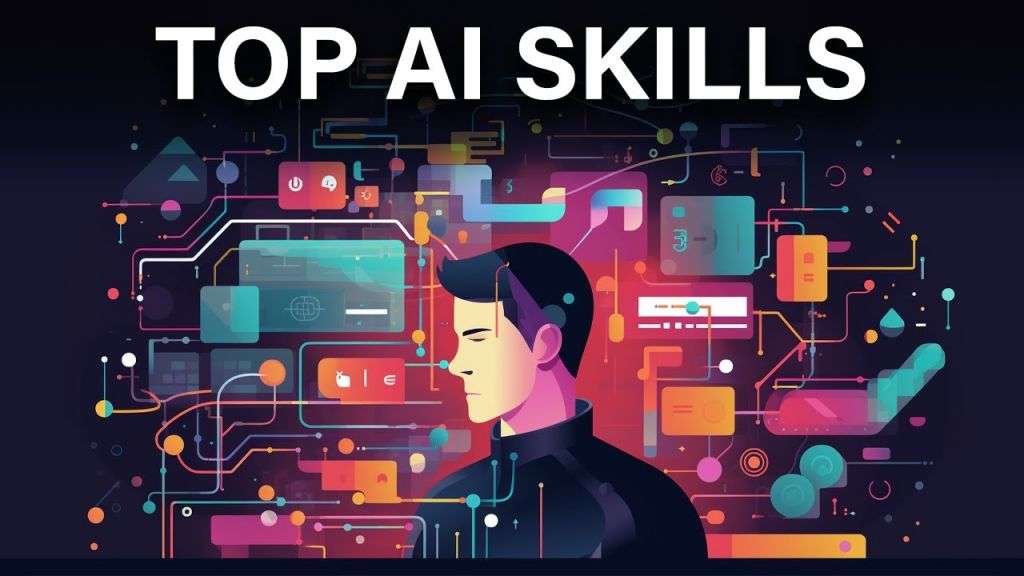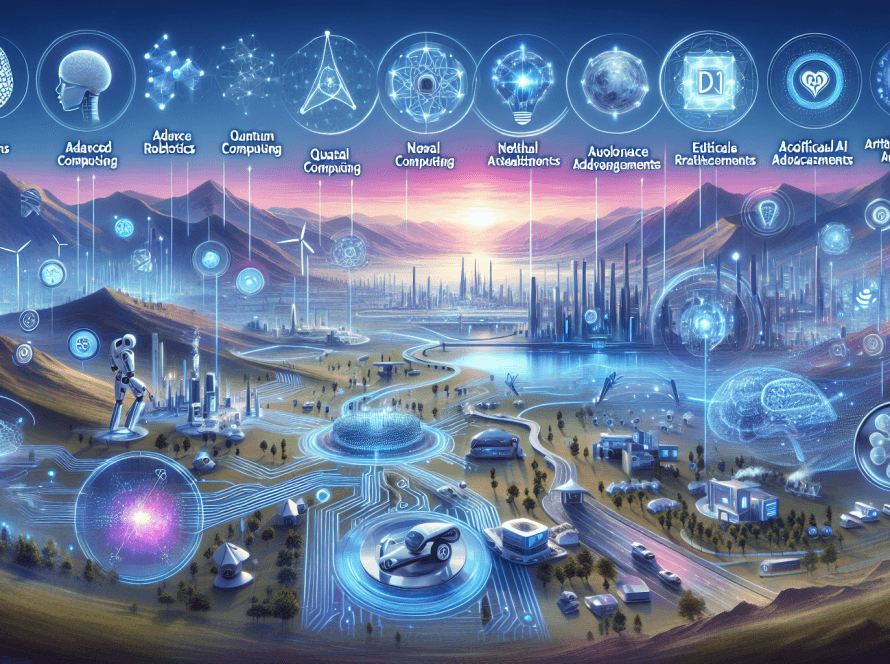Imagine the doors to the future swinging open and revealing a new era where artificial intelligence is the cornerstone of innovation. Your journey into this brave new world is about to unfold as you step into the realm of “The 10 AI Skills That Will Be In High Demand In 2024.” With industries rapidly integrating these technologies, your ability to master these top skills could be the key to unlocking your full potential in an AI-driven landscape.
As you immerse yourself in the article, you’ll uncover the building blocks that will empower you to thrive in this evolving environment. You have the chance to sharpen your proficiency in revolutionary fields such as machine learning, neural networks, and computer vision, while also embracing the critical role of ethics and responsible AI practices. Embrace the shift, prepare to ride the wave of technological transformation, and set the stage for a future where your skills align with the cutting edge of artificial intelligence.
Machine Learning Expertise
Understanding and Building Predictive Models
You’ll find that grasping machine learning starts with predicting outcomes using historical data. It’s your job to understand and build predictive models that can analyze this data and forecast future trends. These models are constructed using various statistical techniques and algorithms. You should be well-versed in regression analysis, classification, and clustering methods so you can better serve industries that depend heavily on forecasting, such as finance, healthcare, and retail.
Algorithm Development and Maintenance
You will also need to focus on developing and maintaining machine learning algorithms. This includes training these algorithms with large datasets, tuning their parameters for better performance, and updating them according to new data or shifting requirements. Your role is crucial in ensuring that these algorithms stay efficient and effective over time, adapting to the ever-changing datasets they analyze.
Big Data Analytics and Processing
Another critical area of your expertise must be big data analytics and processing. With an ever-expanding volume of data available for analysis, you must efficiently process and derive insights from big sets of complex data. You need to be proficient in using big data frameworks like Apache Hadoop or Spark to manipulate, process, and analyze large datasets that could otherwise be overwhelming.
Deep Understanding of Neural Networks
Architecture of Deep Neural Networks
Your deep understanding of neural networks will be instrumental. You should be familiar with the architecture of deep neural networks, including the various types like convolutional neural networks (CNNs) and recurrent neural networks (RNNs). Knowing how to design and adjust these networks is important for tasks that require processing vast amounts of data for classification, regression, and feature learning.
Advanced Pattern Recognition
Deep learning is at the forefront of advanced pattern recognition. Proficiency in this field means you can enable machines to recognize complex patterns in data, much like humans do. This capability forms the basis for progress in areas such as speech recognition, language processing, and image interpretation.
Innovations in Neural Network Technologies
Innovations in neural network technologies are progressing rapidly, and your ability to keep up with these advancements will set you apart. You should be attuned to the latest research and ready to apply cutting-edge methodologies to practical applications. Your ability to innovate will drive the field forward.

Proficiency in Natural Language Processing (NLP)
Algorithm Creation for Language Understanding
Mastering NLP entails developing algorithms for language understanding. You’ll create systems that can comprehend and generate human language, making interactions between humans and machines more seamless. This expertise is indispensable in improving search engines, voice-activated assistants, and customer service chatbots.
Machine Translation and Sentiment Analysis
Part of your role in NLP will be to advance machine translation and sentiment analysis. Through machine translation, you’ll reduce language barriers, while sentiment analysis will allow businesses to gauge public opinion from online content. Your solutions will be vital for global communication and insightful business analytics.
Augmenting Human-Machine Interaction
Augmenting human-machine interaction is yet another area where your NLP skills will shine. As you work on conversational agents and virtual assistants, focus on making these interactions smooth and intuitive. Your work will elevate the way we interact with technology on a daily basis.
Computer Vision Capabilities
Image and Video Analysis Techniques
Computer vision is about endowing machines with the ability to understand the visual world. Your expertise in image and video analysis techniques will enable you to create systems that can identify, classify, and react to visual data. With your help, machines can perform tasks ranging from the simple detection of objects to the complex interpretation of live video feeds.
Applications in Various Industries
Your experience in computer vision will find applications across a multitude of industries. From healthcare, where automated image diagnosis in radiology is crucial, to automotive industry advancements such as driver assistance systems and autonomous vehicles, your skills will be highly sought after.
Integration with AI Systems
You’ll also play a crucial role in the integration of computer vision with broader AI systems. This ensures that the insights gathered from visual data can be effectively used in decision-making. The integration of these technologies will lead to smarter and more autonomous AI applications.

Reinforcement Learning Knowledge
Adaptive Learning Algorithms
Reinforcement learning involves creating adaptive learning algorithms that learn to make decisions by interacting with their environment. You’ve mastered the art of designing these algorithms to optimize performance, and they will be heavily used in gaming, robotics, and any other system where sequence-based decision-making is necessary.
Application in Robotics and Gaming
In robotics and gaming, your knowledge will be especially valuable. You’ll create AI that can navigate complex environments and perform tasks with minimal human oversight. In gaming, you’re pushing the envelope in developing more challenging and responsive AI opponents.
Strategies for Complex Problem-Solving
Your expertise extends to forming strategies for complex problem-solving. Reinforcement learning algorithms can be designed to approach problems in innovative ways, generalizing from past experiences to tackle unprecedented challenges.
Ethical AI Development and Bias Mitigation
Creation of Ethically Responsible AI
You are also responsible for ensuring that the AI systems you build are ethically responsible. This means not only following a code of ethics in your development process but also implementing mechanisms to ensure that AI behaves within socially-accepted norms.
Methods for Reducing Bias in AI Systems
Reducing bias is paramount, and you’ve honed methods to mitigate it in AI systems. This includes auditing datasets for representativeness, testing algorithms for fairness, and ensuring diversity in the training data. Your vigilant approach helps create more equitable AI technologies.
Ethical Implications of AI Applications
You understand the ethical implications of AI applications. Your insight into ensuring that AI developments benefit society, protect privacy, and maintain security forms the foundation for trustworthy technologies.

Responsible AI Practices
AI Governance and Policy-Making
As an AI professional, you contribute to AI governance and policy-making. You provide expert advice on how AI systems should be regulated and monitored, offering recommendations for policy that guides the responsible development and deployment of AI technologies.
Sustainable AI Lifecycle Management
Your role includes sustainable AI lifecycle management. You ensure that AI systems are designed with their full lifecycle in mind, considering their long-term impact, maintenance needs, and the eventual retirement of systems in a responsible manner.
Transparency and Accountability in AI
Transparency and accountability are values you uphold in AI. This means creating systems where decisions can be explained, and the processes behind AI outputs are open to inspection. Your drive for accountable AI assures stakeholders of the legitimacy and fairness of the systems in place.
Robotics Engineering
Design and Development of Robotic Systems
Your robotics engineering skills are applied in the design and development of complex robotic systems. You’re capable of crafting systems that can perform a wide range of tasks, from assembly line automation to exploring distant planets.
Integration of AI in Robotics
Integration of AI in robotics is your expertise, ensuring that robots can learn, adapt, and operate autonomously. Your experience in embedding intelligent systems into robotic hardware is revolutionary, pushing the limits of what these systems can do.
Improvements in Automation and Efficiency
Seeking improvements in automation and efficiency, you work tirelessly. Your innovations in robotics lead to greater productivity and the ability to perform tasks that go beyond human capabilities, reshaping industry landscapes.
AI Security
Cybersecurity Threats to AI Systems
You’re aware of the growing cybersecurity threats to AI systems and take measures to protect them. You design AI with security in mind, safeguarding against attacks that could lead to the exploitation of machine learning models or compromise sensitive data.
Developing Robust Security Protocols
Your skill set includes developing robust security protocols for AI systems. You ensure that both the data used by AI and the systems themselves are resistant to misuse, thereby establishing trust and reliability in AI systems.
Ensuring Trust and Privacy in AI
Ensuring trust and privacy is a significant aspect of your work. It’s crucial that users can rely on AI systems to handle their data with care and respect. You help create an environment where AI interactions are based on trust and privacy is always protected.
Conclusion
Summary of In-Demand AI Skills for 2024
As 2024 approaches, you understand that machine learning expertise, deep knowledge of neural networks, NLP proficiency, computer vision capabilities, reinforcement learning, ethical AI development, responsible AI practices, robotics engineering, and AI security are the in-demand AI skills. Being adept in these areas will position you well for the flood of opportunities that will arise as AI continues to integrate into every facet of society and industry.
How These Skills Influence Future Trends
The skills you cultivate will have a profound influence on future AI trends. AI systems you help create will increasingly drive innovation across various sectors, necessitating a workforce that is adept in the nuances of artificial intelligence. The evolution of AI ensures that your skills will be pivotal in shaping future technologies and methods of human-computer interaction.
Final Guidance for AI Enthusiasts and Professionals
For those who are enthusiasts or already professionals in the field of AI, your journey is one of perpetual learning and adaptation. You understand that the AI landscape is continuously evolving, and so should your skills and knowledge. Embrace the dynamics of AI advancements, and you’ll remain a valuable asset in this transformative industry. Your commitment is not only to your professional growth but also to contributing responsibly to the way AI reshapes our world.


